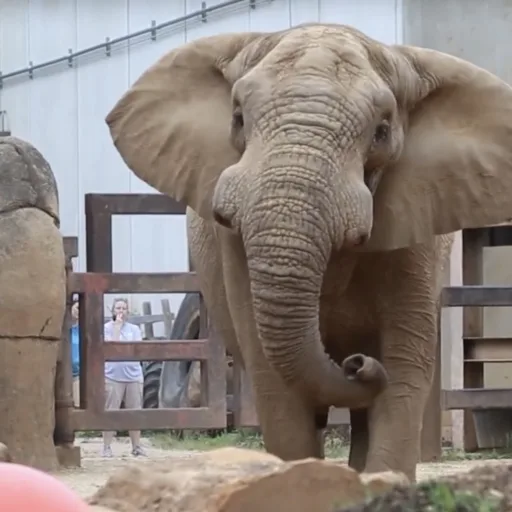
Tonka (Deceased)
Zoo Knoxville (Knoxville, TN)
Tonka was born around 1978 in South Africa’s Kruger National Park, but in 1981, humans violently tore him from his familial herd and imported him to the United States. From March 10, 1981 until his death on May 8, 2024, he was confined at Zoo Knoxville, which provided less than an acre of space to all of the elephants confined there. Despite attempts by the zoo to breed Tonka, he never sired any offspring. His life was defined by isolation, subjugation, exploitation, and suffering.
Tonka's Story
Tonka was born around 1978 in South Africa’s Kruger National Park. In 1981, humans violently tore him from his familial herd and imported him to the United States. For 43 years–from March 10, 1981 until his death–he was confined at Zoo Knoxville, which provided less than an acre of space to all of the elephants confined there. Despite attempts by the zoo to breed Tonka, he never sired any offspring. He was held separate from other elephants most of his life, made to engage in unnatural behaviors such as painting, and housed in an extraordinarily small and impoverished environment known to cause elephants psychological and physical harm.
In 2022, Zoo Knoxville announced its intent to move the three surviving elephants confined at their facility (Tonka, along with female elephants Jana and Edie) to The Elephant Sanctuary in Tennessee (TES) as part of their end-of-life care plan. Jana and Edie were successfully moved to the sanctuary in 2023, but not unexpectedly, Jana died shortly after her arrival due to the physical toll that zoo captivity had taken on her body.
Tonka remained confined alone at Zoo Knoxville, which planned to move him to TES in late 2023. On May 6, 2024, the zoo announced that Tonka had been placed on hospice care after developing pain and swelling in his front leg on April 28th. On May 9th, the zoo announced that Tonka had been euthanized the previous day. He was only 46 years old.
Tonka’s story–defined by isolation, subjugation, exploitation, and suffering–is a tragic, common one for elephants confined in AZA-accredited zoos. He died in what would have been the prime of his life had he remained in the wild: male African elephants attain peak reproduction age between 40 and 55 years old and can live up to 70 years. Instead of remaining free in the wild–where he likely would have sired offspring and help grow the wild elephant population, as well as play a key role in the ecosystem–he was unjustly held captive for 43 years on a small plot of land, where he deteriorated day after day, year after year.
From a conservation perspective, what was the point? How many people who saw him for a few moments standing in a dirt patch took action to help wild African elephants? What did seeing an elephant outside of his natural environment, engaging in behaviors unseen in the wild, teach children? His captivity provided no assistance to his species’ survival, though even if it did, that could not remotely justify the horrors inflicted upon him.
To the zoo and the government who authorized his unjust captivity, Tonka was just a “thing” to be exploited, at the expense of his well-being and dignity. He deserved, as all elephants do, to have his right to liberty respected–to live freely and enjoy the life nature intended for him to lead.
The lesson from Tonka’s tragic story is not that elephant captivity supports conservation, but that zoos kill elephants–either quickly, through accidents or exposure to viruses, or slowly, by holding them in unnatural environments known to cause their minds and bodies to break down. As a society, it is time we reflect on what we’re doing to these magnificent beings. May no other elephant suffer as Tonka did.
Take action today
A future where no elephant has to endure the traumas of being torn from their families and natural habitats, bred against their will, and shipped from zoo to zoo is possible, and we need your help to make it a reality.
Submit Information
Do you have a tip for us? The Free to be Elephants project relies on our supporters to keep us up-to-date with the latest news, updates and photos about elephants in their local facilities. Use this form to submit your info and help us expose the reality of elephant captivity across America.